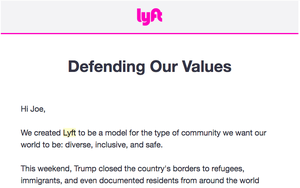
In its first week in office, actions by the Trump Administration have triggered international crises for many marketers, some of whom are taking their own form of action in what might well
be described as “opposition branding.”
Executive orders to build the wall between the U.S. and Mexico and to ban travel from some mostly Islamic nations prompted a
number of brands to make public statements, contribute financial support and even run ads in opposition to the White House actions.
Not surprisingly, some of the greatest opposition
to the new establishment president came from new establishment brands such as Airbnb and Lyft.
Within hours of an email and PR campaign criticizing Trump’s immigration ban,
particularly on refugees, and donating $1 million to the American Civil Liberties Union, Lyft begin seeing some brand lift as a number of Hollywood celebrities tweeted their support for the
ride-sharing service and called for a boycott of rival Uber, which was perceived as supporting the White House.
advertisement
advertisement
“We stand firmly against these actions, and will not be silent
on issues that threaten the values of our community,” Lyft co-founders Logan Green and John Zimmer wrote.
A grassroots social media campaign urging people to “delete” Uber
was prompted when Uber drivers broke the yellow taxi strike at JFK airport in New York City and because Uber CEO Travis Kalanick has been seen as collaborating with Trump.
Kalanick
is one of several members of industry that have been appointed to Trump’s business advisory group, and he recently called on Uber employees to be supportive of the new administration, noting,
"We'll partner with anyone in the world as long they're about making transportation in cities better, creating job opportunities, making it easier to get around, getting pollution out of the air and traffic off the streets.”
air and traffic off the streets.”
By late Sunday, Uber had shifted its public position on at least one Trump action, as the #DeleteUber
campaign began trending.
In response, Kalanick tweeted that Trump's travel ban "is against everything Uber stands for." He noted the ban affects thousands of Uber drivers and said
Uber would compensate them for lost earnings if they’re unable to work because of the ban.
Another sharing economy brand, Airbnb, meanwhile, extended a welcome hand, offering
“free housing to refugees and anyone allowed in the U.S.,” according to a tweet by CEO and Co-Founder Brian Chesky.
While most conventional consumer brands have been
sitting on the sidelines, the tech industry and especially Hollywood have been taking vocal positions against the Trump Administration’s actions. Though one of those actions, Trump’s order
to begin building a wall along the U.S. border with Mexico, did prompt some marketing from at least one brand. Corona, which is actually owned by Dutch brewer Heineken, broke an ad celebrating that
American has always been great. The spot ends with the tagline: América es
grande.
In a tweet on Friday, Sen. Lindsey Graham leaned in with some support of the Corona brand, noting, “Simply put, any policy proposal which drives up costs of Corona, tequila,
or margaritas is a big-time bad idea. Mucho Sad.”
 With Madison Avenue’s biggest game looming,
observers are wondering if any of this year’s Super Bowl spots will take an oppositional position, though most of the spots teased or previewed to date have been safe and politically
neutral.
With Madison Avenue’s biggest game looming,
observers are wondering if any of this year’s Super Bowl spots will take an oppositional position, though most of the spots teased or previewed to date have been safe and politically
neutral.
Though at least one campaign has already been rejected by Super Bowl network Fox for hitting the wall, literally. A 90-second recruitment ad from construction materials
supplier Lumber 84 was rejected by the network because it depicted the wall and was deemed too controversial.
Meanwhile, the material impact of the new immigration policies stands to impact
Madison Avenue as much as any other industry, maybe more.
“These rules could have implications for agency holding companies if the policy persists and is more likely if
the policy is expanded,” Pivotal Research Group Analyst Brian Wieser writes in a note sent to Wall Street investors late Sunday.
“While press has focused on the impact that
restrictive immigration policies may have on the technology industry, the largest advertising and marketing services companies are also affected, and could be to a greater degree,” he continued,
adding, “The industry’s most important clients typically have global operations, and its talent base (especially its most valuable business unit, professionals) is also commonly global by
nature and birth.
"Beyond the impact of banning individuals born in specific countries, if the U.S. is viewed as less hospitable to foreigners, individuals with roots or family members outside
the U.S. will be discouraged from working for agency groups with significant U.S. operations given the need to travel to the U.S. for internal and external meetings. If this occurs, independent or
geographically contained agencies based outside of the U.S. could benefit. As we believe that at least some share of global agency holding companies’ growth occurs because they have gained
market share from such agencies, any reversal of this trend would be negative for the group.”